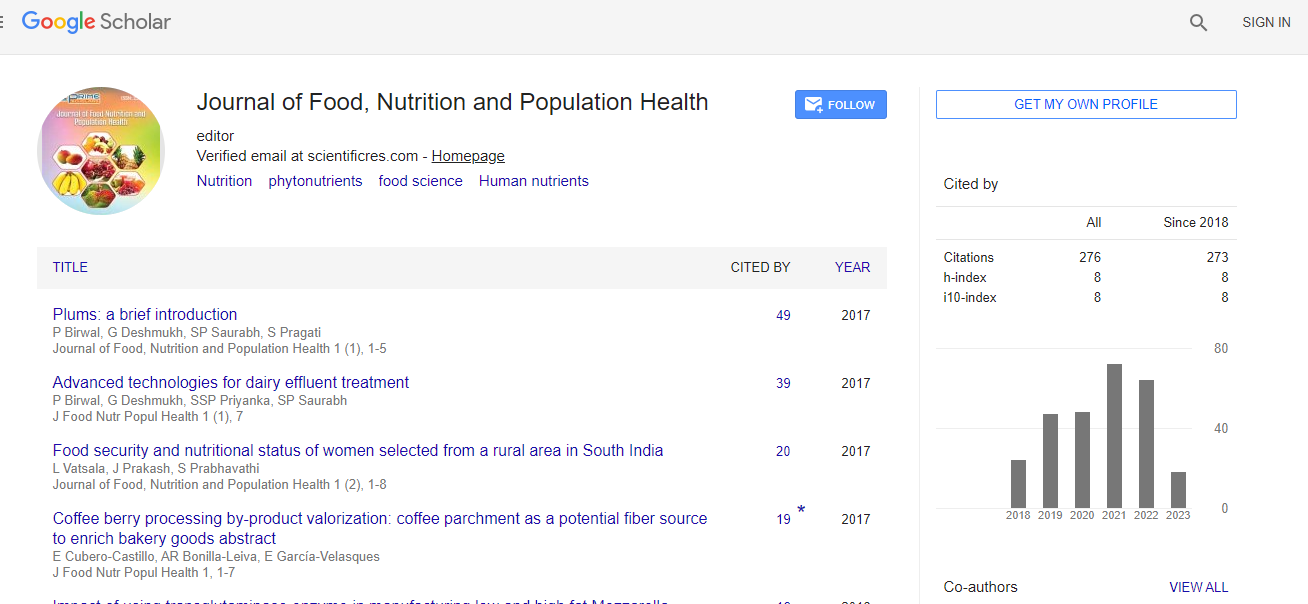Commentary - (2024) Volume 8, Issue 3
Understanding the Paradox between Malnutrition and Obesity
Amelia Harris*
Department of Food and Nutrition, University of Chicago, USA
*Correspondence:
Amelia Harris,
Department of Food and Nutrition, University of Chicago,
USA,
Email:
Received: 02-Sep-2024, Manuscript No. IPJFNPH-24-21229;
Editor assigned: 04-Sep-2024, Pre QC No. IPJFNPH-24-21229 (PQ);
Reviewed: 18-Sep-2024, QC No. IPJFNPH-24-21229;
Revised: 23-Sep-2024, Manuscript No. IPJFNPH-24-21229 (R);
Published:
30-Sep-2024, DOI: 10.21767/2577-0586.8.3.25
Description
Malnutrition and obesity, though seemingly contradictory,
represent two sides of the same coin in the global health
landscape. Both conditions are significant public health issues
that impact millions of people worldwide, yet they share
underlying connections and can co-occur within populations.
Here’s an overview of malnutrition and obesity, their interplay,
and their implications for health. Malnutrition refers to a
condition where an individual’s dietary intake does not meet
their nutritional needs. It can manifest as undernutrition or
overnutrition. Undernutrition includes deficiencies in essential
nutrients such as proteins, vitamins, and minerals, leading to
stunted growth, wasted muscle, and increased susceptibility
to infections. Overnutrition occurs when there is an excess
of certain nutrients, which may contribute to health issues
such as obesity. Limited access to sufficient and diverse
food sources can lead to nutrient deficiencies. Even when
food is available, a diet high in processed foods and low in
fruits, vegetables, and whole grains can result in nutritional
imbalances. Poverty, lack of education, and limited healthcare
access can exacerbate malnutrition. Underweight children
may experience delayed development, weakened immune
systems, and higher mortality rates. Malnutrition can impair
cognitive development, reduce productivity, and contribute
to chronic health issues. Obesity is characterized by excessive
body fat accumulation, commonly measured using Body Mass
Index (BMI). It is associated with an increased risk of various
chronic diseases, including heart disease, diabetes, and certain
cancers. Consuming more calories than the body expends leads
to fat accumulation. Diets high in sugars, fats, and processed
foods are significant contributors. Sedentary lifestyles,
including excessive screen time and lack of exercise, contribute
to weight gain. Genetics can influence metabolism and fat
storage, while environmental factors, such as urban design and
access to recreational facilities, play a role. Obesity is linked
to numerous health issues, including cardiovascular diseases,
type 2 diabetes, hypertension, and sleep apnea. It can affect
mobility, self-esteem, and overall quality of life, leading to
mental health challenges. Malnutrition and obesity can coexist,
particularly in low-income settings where food choices may be
limited. Individuals may consume energy-dense but nutrientpoor
foods, leading to both overnutrition and deficiencies in
essential nutrients. Even in the presence of obesity, individuals
can suffer from micronutrient deficiencies, as their diet may lack
variety despite high caloric intake. Both conditions contribute
to increased healthcare expenses due to associated chronic
diseases and complications. Economic constraints and limited
access to healthy foods often contribute to the prevalence of
both malnutrition and obesity. Promoting awareness about
balanced diets and healthy eating habits is essential for
preventing and managing both conditions. Improving access
to nutritious foods, supporting physical activity programs, and
addressing socioeconomic disparities are critical for tackling
malnutrition and obesity. Healthcare providers should focus
on comprehensive assessments to address both nutrient
deficiencies and excesses, offering personalized guidance
and support. Malnutrition and obesity are complex and
interconnected issues that require multifaceted strategies to
address. Recognizing their relationship and addressing both
undernutrition and overnutrition through education, policy,
and healthcare interventions can help mitigate their impact
on global health. By fostering an environment that supports
balanced nutrition and healthy lifestyles, we can work towards
alleviating these conditions and improving overall well-being.
Acknowledgement
None.
Conflict Of Interest
None.
Citation: Harris A (2024) Understanding the Paradox between Malnutrition and Obesity. J Food Nutr Popul Health. 8:25.
Copyright: © 2024 Harris A. This is an open-access article distributed under the terms of the Creative Commons Attribution License, which permits unrestricted use, distribution, and reproduction in any medium, provided the original author and source are credited.

